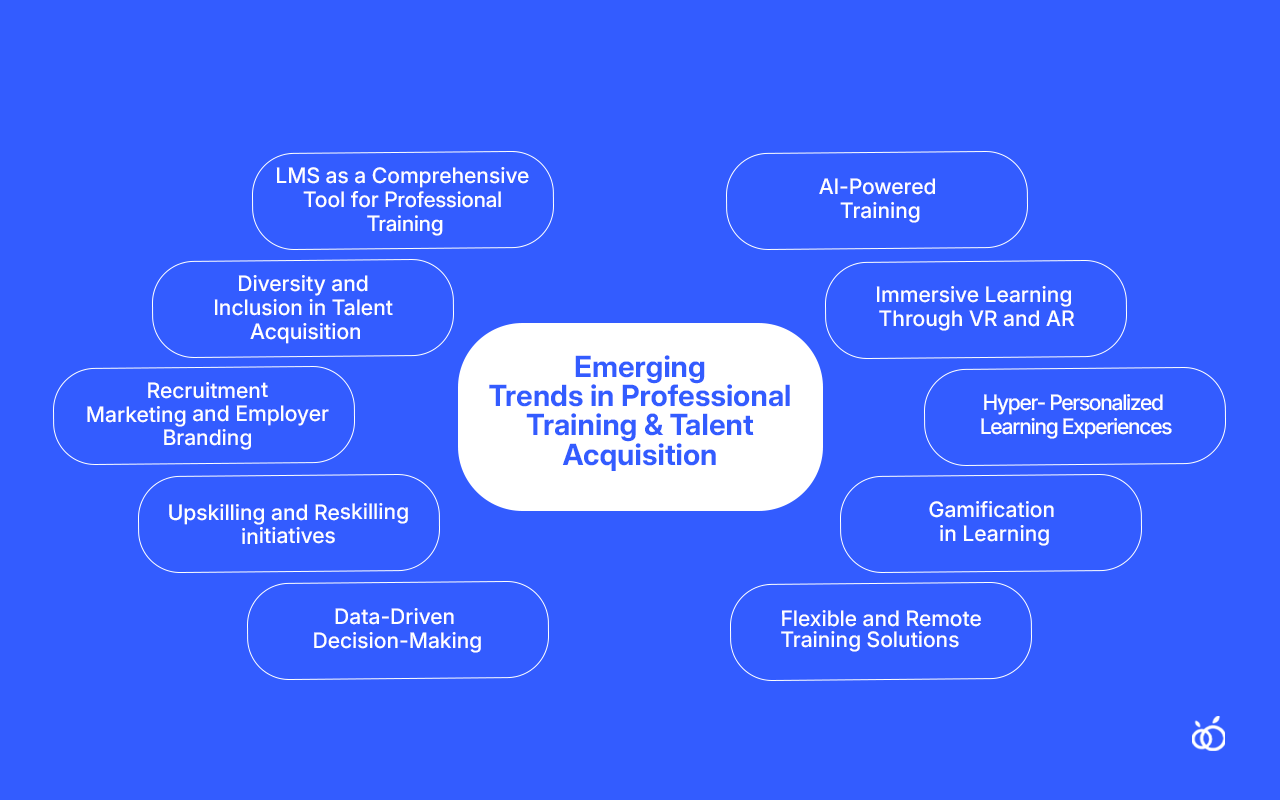Published January 9, 2025
Emerging Trends in Professional Training and Talent Acquisition for 2025
Imagine a world where talent isn't constrained by borders, and where learning never stops. This isn't a far-off dream but a swiftly unfolding reality in the realms of professional training and talent acquisition. In an era characterized by rapid technological advancements and shifting workforce dynamics, the way HR departments approach training and hiring is evolving at an unprecedented pace. Traditional methods are being supplemented, and in some cases replaced, by innovative strategies that prioritize continuous learning, skills-based hiring, and global connectivity.
As the future of recruiting continues to change, organizations are focusing on attracting and retaining top talent by aligning job descriptions with the skills needed for success, empowering hiring managers to make more informed decisions. With an emphasis on skill sets, companies are embracing the latest talent acquisition trends to boost productivity and foster a more agile workforce.
Talent Acquisition: The Strategic Foundation
Talent acquisition goes beyond filling job vacancies. It is a strategic process aimed at identifying, engaging, and onboarding individuals who align with an organization's long-term goals. Companies with well-integrated talent management strategies report higher revenue per employee and lower turnover rates compared to their competitors. Professional training and talent acquisition are pivotal in driving organizational success by fostering a skilled, adaptive, and innovative workforce.
"I will argue that talent acquisition departments in a modern organization may be the single most valuable differentiator an organization can have, next to a killer sales and marketing department. We can argue chicken or the egg, but if you can hire the best talent in your market, and you can sell the heck out of your products and services, you're going to win many more times than you'll lose."
Trends in Professional Training and Talent Acquisition for 2025
AI-Powered Training
Artificial Intelligence (AI) is revolutionizing professional training and talent acquisition in 2025, transforming how organizations develop their workforce and attract top talent. In talent acquisition, AI is streamlining recruitment processes by using predictive analytics to identify candidates with the desired skills and cultural fit for an organization. AI systems can analyze vast amounts of data from resumes, social media profiles, and online behavior, allowing recruiters to make more informed and efficient decisions. Moreover, AI enhances the onboarding experience by creating tailored learning paths for new hires, helping them transition more smoothly into the company.
According to Mercer's Global Talent Trends Report 2025, AI has enhanced efficiency in talent acquisition by reducing the average time-to-hire by 30-40%, particularly for specialized roles, with 63% of organizations utilizing AI-driven tools to automate candidate screening and ranking based on skills rather than traditional qualifications.
Immersive Learning Through Virtual Reality (VR) and Augmented Reality (AR)
Imagine stepping into a virtual world where job roles and training programs come to life. With Virtual Reality (VR) and Augmented Reality (AR), candidates can immerse themselves in realistic job simulations, offering a clearer picture of the role before committing. These technologies enhance onboarding by allowing new hires to practice tasks in a risk-free environment and develop practical skills quickly.
By shifting focus to real-world abilities rather than resumes, VR and AR are revolutionizing talent acquisition and professional training, making the entire process more engaging, personalized, and effective. Walmart, for example, uses VR to train employees and assess candidates during recruitment.
Hyper-Personalization
Hyper-personalization is revolutionizing talent acquisition and professional training by focusing on individual skills, needs, and aspirations. AI-powered tools help match candidates with roles that align with their unique strengths, while data-driven insights enable companies to craft personalized development plans for employees, fostering growth through tailored learning paths.
A LinkedIn study underscores the value of personalized communication, reporting a 30% rise in candidate engagement and a 50% drop in time-to-fill roles. By addressing individual needs and preferences, organizations enhance engagement, accelerate career development, and achieve better recruitment and training outcomes.

Gamification
Gamification is revolutionizing professional training and talent acquisition by incorporating game-like features, such as points, leaderboards, and challenges, to boost engagement and motivation. For example, PwC uses a gamified assessment called "Multipoly," which challenges candidates with real-world business decisions in a game format. This interactive approach helps assess candidates' problem-solving and decision-making abilities, making the recruitment process more engaging and insightful.
Flexible and Remote Solutions
Remote solutions in talent acquisition and professional training are essential in today's workforce, offering flexibility and expanding opportunities. Virtual recruiting platforms and AI tools help companies assess, interview, and onboard candidates globally, enhancing the talent pool and candidate experience.
The shift to remote work, accelerated by the COVID-19 pandemic work-from-home mandates, has transformed recruitment into a mainstream model, with more candidates seeking remote or hybrid positions. Despite a rise in return-to-work mandates, organizations maintaining remote work options continue to implement strategies to ensure remote employees feel connected and supported.
Data-Driven Decision-Making
Data analytics plays a key role in both training and recruitment. Companies are increasingly using data to inform their decisions, optimize training programs, and improve hiring processes.
LinkedIn's Talent Insights tool, for example, provides recruiters with valuable data on talent availability, hiring trends, and competitive benchmarks, enabling companies to refine their recruitment strategies and attract top talent. By making data-driven decisions, organizations ensure that they are continuously improving their employee development and recruitment processes.
Upskilling and Reskilling Initiatives
As technological advancements continue to reshape industries, upskilling and reskilling have become critical components of workforce sustainability. In 2025, organizations are proactively identifying emerging skill gaps and offering targeted training to ensure their workforce remains competitive.
Amazon's "Upskilling 2025" program, for example, aims to invest $1.2 billion to upskill 300,000 employees by offering technical training, apprenticeship opportunities, and certifications in areas like cloud computing and machine learning. This proactive approach ensures employees are equipped with the necessary skills to adapt to the evolving job market.
Recruitment Marketing and Employer Branding
In today's competitive talent market, employer branding has taken center stage. Companies are leveraging social media, employee testimonials, and targeted advertising to highlight their company culture and attract top talent.
HubSpot, for example, uses its careers page to feature videos and blogs showcasing employee experiences and company values, providing transparency that resonates with potential candidates who align with the organization's mission and culture.
Diversity and Inclusion in Talent Acquisition
Diversity and inclusion have become a central focus in talent acquisition strategies for 2025. Companies are increasingly implementing policies and technologies that promote equitable hiring practices to ensure a diverse workforce.
For example, Microsoft's "Neurodiversity Hiring Program" is an initiative designed to recruit individuals with autism, creating an inclusive hiring process that provides tailored support. This program helps Microsoft tap into a pool of highly talented individuals with unique perspectives, contributing to a more innovative and dynamic workplace.
Learning Management Systems (LMS) as a Comprehensive Tool
LMS play a crucial role in both talent acquisition and professional training by providing a centralized platform for managing and delivering educational content. In talent acquisition, LMS can be used to onboard new hires, offering a seamless integration of training materials and company policies, ensuring consistency and efficiency in the onboarding process. For professional training, LMS platforms support continuous employee development by offering personalized learning paths, skill assessments, and progress tracking, helping employees grow in their roles. By providing accessible, scalable, and engaging learning experiences, LMS platforms foster a culture of continuous learning, improving employee performance and retention.
Conclusion
In conclusion, emerging trends in professional training and talent acquisition are reshaping how organizations attract, develop, and retain top talent. By leveraging advanced technologies and personalized learning, companies can enhance candidate engagement, foster continuous learning, and build a skilled, adaptable workforce.
As trends in 2025 continue to transform the recruitment landscape, organizations are moving away from traditional hiring methods and focusing more on hiring for skills. This shift helps align talent attraction strategies with the demand for new skills, ensuring a workforce capable of meeting evolving business challenges.


